英语语法专项:虚拟语气用法详解及练习(附答案)
- 格式:docx
- 大小:22.97 KB
- 文档页数:10
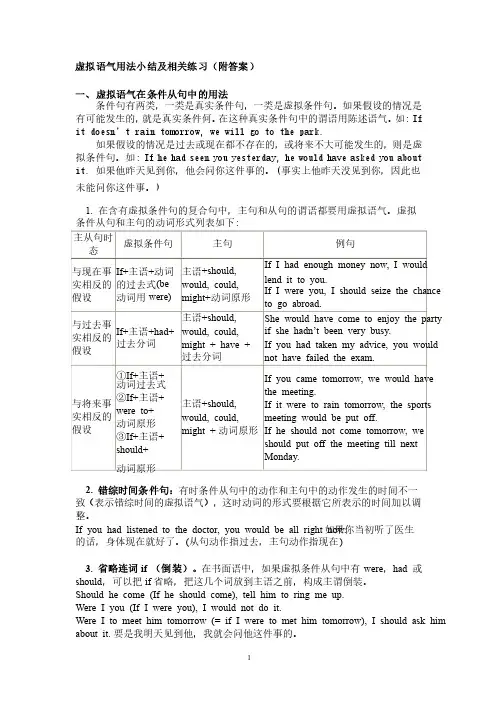
虚拟语气用法小结及相关练习(附答案)一、虚拟语气在条件从句中的用法 条件句有两类,条件句有两类,一类是真实条件句,一类是真实条件句,一类是真实条件句,一类是虚拟条件句。
一类是虚拟条件句。
一类是虚拟条件句。
如果假设的情况是如果假设的情况是有可能发生的,就是真实条件何。
在这种真实条件句中的谓语用陈述语气。
如: If it doesn’t rain tomorrow, we will go to the park.如果假设的情况是过去或现在都不存在的,如果假设的情况是过去或现在都不存在的,或将来不大可能发生的,或将来不大可能发生的,则是虚拟条件句。
如拟条件句。
如: : If he had seen you yesterday, yesterday, he he would have asked you about it. it. 如果他昨天见到你,他会问你这件事的。
如果他昨天见到你,他会问你这件事的。
(事实上他昨天没见到你,因此也未能问你这件事。
未能问你这件事。
) )1. 在含有虚拟条件句的复合句中,主句和从句的谓语都要用虚拟语气。
虚拟条件从句和主句的动词形式列表如下: 主从句时态虚拟条件句虚拟条件句 主句主句 例句例句 与现在事与现在事 实相反的实相反的 假设假设 If+主语+动词动词 的过去式(be 动词用were) 主语+should, would, could, might+动词原形动词原形 If I had enough money now, I would lend it to you. If I were you, I should seize the chance to go abroad. 与过去事与过去事 实相反的实相反的 假设假设 If+主语+had+ 过去分词过去分词 主语+should, would, could, might + have + 过去分词过去分词 She would have come to enjoy the party if she hadn’t been very busy. If you had taken my advice, you would not have failed the exam. 与将来事与将来事 实相反的实相反的 假设假设 ①If+主语+ 动词过去式动词过去式②If+主语+ were to+ 动词原形动词原形 ③If+主语+ should+ 动词原形动词原形 主语+should, would, could, might + 动词原形动词原形 If you came tomorrow, we would have the meeting. If it were to rain tomorrow, the sports meeting would be put off. If he should not come tomorrow, we should put off the meeting till next Monday. 2. 错综时间条件句:有时条件从句中的动作和主句中的动作发生的时间不一致(表示错综时间的虚拟语气)(表示错综时间的虚拟语气),,这时动词的形式要根据它所表示的时间加以调整。
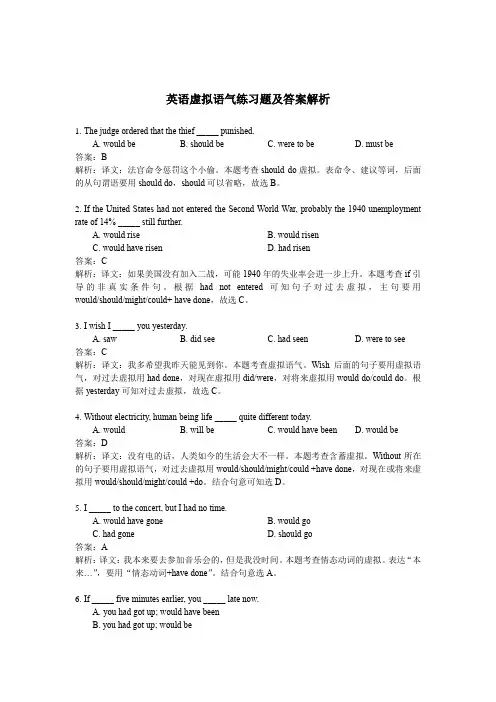
英语虚拟语气练习题及答案解析1.The judge ordered that the thief _____ punished.A. would beB. should beC. were to beD. must be答案:B解析:译文:法官命令惩罚这个小偷。
本题考查should do虚拟。
表命令、建议等词,后面的从句谓语要用should do,should可以省略,故选B。
2.If the United States had not entered the Second World War, probably the 1940 unemployment rate of 14% _____ still further.A. would riseB. would risenC. would have risenD. had risen答案:C解析:译文:如果美国没有加入二战,可能1940年的失业率会进一步上升。
本题考查if引导的非真实条件句。
根据had not entered可知句子对过去虚拟,主句要用would/should/might/could+ have done,故选C。
3.I wish I _____ you yesterday.A. sawB. did seeC. had seenD. were to see答案:C解析:译文:我多希望我昨天能见到你。
本题考查虚拟语气。
Wish后面的句子要用虚拟语气,对过去虚拟用had done,对现在虚拟用did/were,对将来虚拟用would do/could do。
根据yesterday可知对过去虚拟,故选C。
4.Without electricity, human being life _____ quite different today.A. wouldB. will beC. would have beenD. would be答案:D解析:译文:没有电的话,人类如今的生活会大不一样。
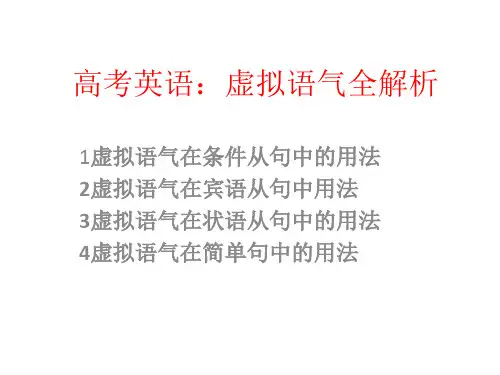
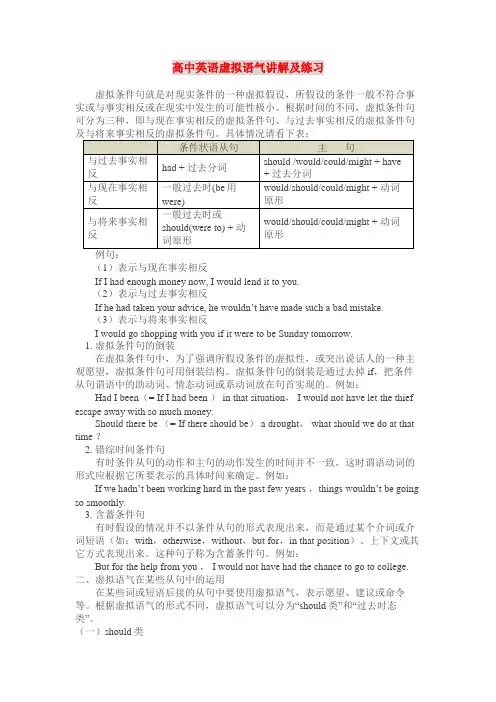
高中英语虚拟语气讲解及练习虚拟条件句就是对现实条件的一种虚拟假设,所假设的条件一般不符合事实或与事实相反或在现实中发生的可能性极小。
根据时间的不同,虚拟条件句可分为三种,即与现在事实相反的虚拟条件句、与过去事实相反的虚拟条件句(1)表示与现在事实相反If I had enough money now, I would lend it to you.(2)表示与过去事实相反If he had taken your advice, he wouldn’t have made such a bad mistake.(3)表示与将来事实相反I would go shopping with you if it were to be Sunday tomorrow.1. 虚拟条件句的倒装在虚拟条件句中,为了强调所假设条件的虚拟性,或突出说话人的一种主观愿望,虚拟条件句可用倒装结构。
虚拟条件句的倒装是通过去掉if,把条件从句谓语中的助动词、情态动词或系动词放在句首实现的。
例如:Had I been(= If I had been ) in that situation, I would not have let the thief escape away with so much money.Should there be (= If there should be) a drought, what should we do at that time ?2. 错综时间条件句有时条件从句的动作和主句的动作发生的时间并不一致,这时谓语动词的形式应根据它所要表示的具体时间来确定。
例如:If we hadn’t been working hard in the past few years ,thing s wouldn’t be going so smoothly.3. 含蓄条件句有时假设的情况并不以条件从句的形式表现出来,而是通过某个介词或介词短语(如:with,otherwise,without,but for,in that position)、上下文或其它方式表现出来。
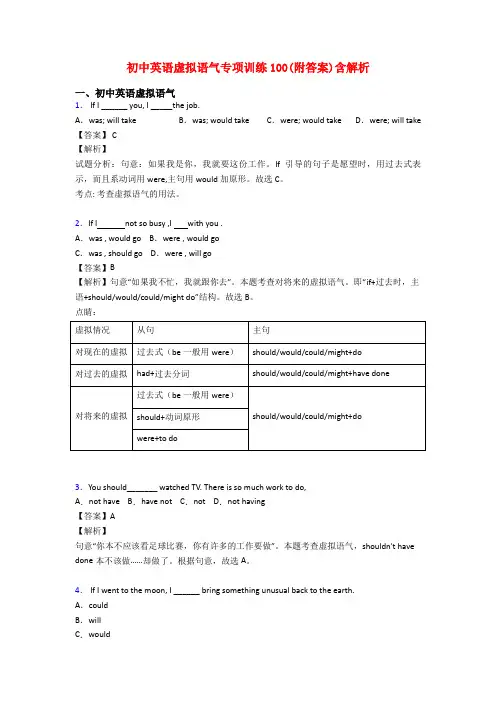
初中英语虚拟语气专项训练100(附答案)含解析一、初中英语虚拟语气1. If I ______ you, I _____the job.A.was; will take B.was; would take C.were; would take D.were; will take 【答案】 C【解析】试题分析:句意:如果我是你,我就要这份工作。
If引导的句子是愿望时,用过去式表示,而且系动词用were,主句用would加原形。
故选C。
考点: 考查虚拟语气的用法。
2.If I not so busy ,I with you .A.was , would go B.were , would goC.was , should go D.were , will go【答案】B【解析】句意“如果我不忙,我就跟你去”。
本题考查对将来的虚拟语气。
即“if+过去时,主语+should/would/could/might do”结构。
故选B。
点睛:3.You should_______ watched TV. There is so much work to do,A.not have B.have not C.not D.not having【答案】A【解析】句意“你本不应该看足球比赛,你有许多的工作要做”。
本题考查虚拟语气,shouldn't have done本不该做……却做了。
根据句意,故选A。
4. If I went to the moon, I ______ bring something unusual back to the earth.A.couldB.willC.wouldD.shall【答案】C【解析】试题分析:此题考查if引导的条件状语从句的相关知识。
根据语境可知此句的含义是如果我去月球,我会带回一些不同寻常的东西。
这个假设成立的几率很小,故看为虚拟语气。
根据语法知识可知从句要用一般过去时,主句要用过去将来时,过去将来时的基本构成would+动词原形,故选C。
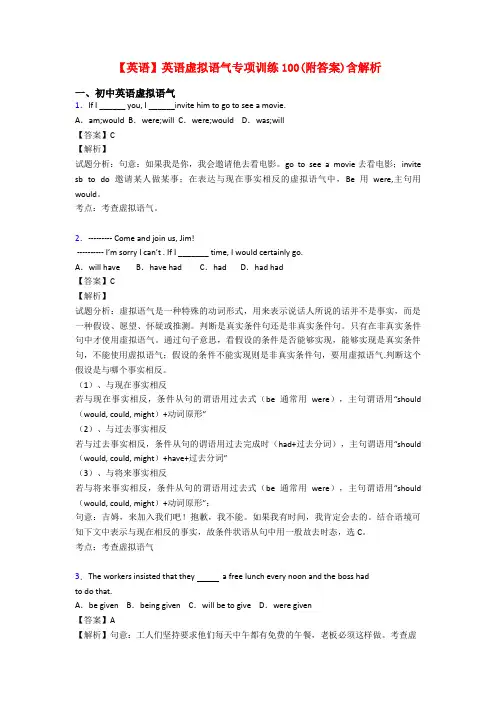
【英语】英语虚拟语气专项训练100(附答案)含解析一、初中英语虚拟语气1.If I ______ you, I ______invite him to go to see a movie.A.am;would B.were;will C.were;would D.was;will【答案】C【解析】试题分析:句意:如果我是你,我会邀请他去看电影。
go to see a movie去看电影;invite sb to do邀请某人做某事;在表达与现在事实相反的虚拟语气中,Be用were,主句用would。
考点:考查虚拟语气。
2.--------- Come and join us, Jim!---------- I’m sorry I can’t . If I _______ time, I would certainly go.A.will have B.have had C.had D.had had【答案】C【解析】试题分析:虚拟语气是一种特殊的动词形式,用来表示说话人所说的话并不是事实,而是一种假设、愿望、怀疑或推测。
判断是真实条件句还是非真实条件句。
只有在非真实条件句中才使用虚拟语气。
通过句子意思,看假设的条件是否能够实现,能够实现是真实条件句,不能使用虚拟语气;假设的条件不能实现则是非真实条件句,要用虚拟语气.判断这个假设是与哪个事实相反。
(1)、与现在事实相反若与现在事实相反,条件从句的谓语用过去式(be通常用were),主句谓语用“should (would, could, might)+动词原形”(2)、与过去事实相反若与过去事实相反,条件从句的谓语用过去完成时(had+过去分词),主句谓语用“s hould (would, could, might)+have+过去分词”(3)、与将来事实相反若与将来事实相反,条件从句的谓语用过去式(be通常用were),主句谓语用“should (would, could, might)+动词原形”:句意:吉姆,来加入我们吧!抱歉,我不能。
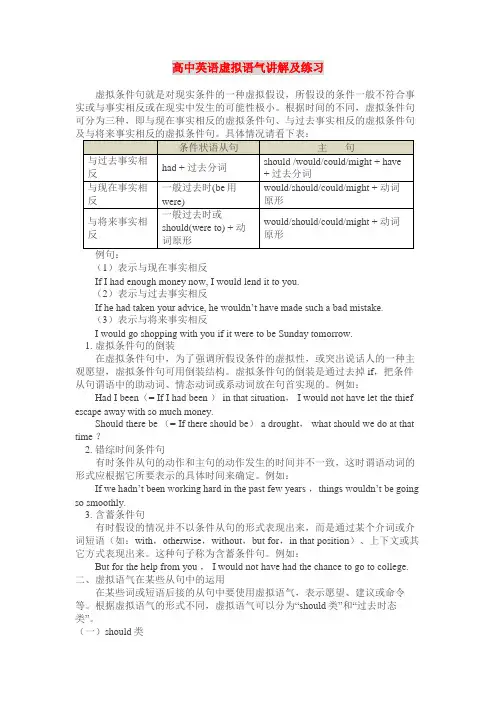
高中英语虚拟语气讲解及练习虚拟条件句就是对现实条件的一种虚拟假设,所假设的条件一般不符合事实或与事实相反或在现实中发生的可能性极小。
根据时间的不同,虚拟条件句可分为三种,即与现在事实相反的虚拟条件句、与过去事实相反的虚拟条件句(1)表示与现在事实相反If I had enough money now, I would lend it to you.(2)表示与过去事实相反If he had taken your advice, he wouldn’t have made such a bad mistake.(3)表示与将来事实相反I would go shopping with you if it were to be Sunday tomorrow.1. 虚拟条件句的倒装在虚拟条件句中,为了强调所假设条件的虚拟性,或突出说话人的一种主观愿望,虚拟条件句可用倒装结构。
虚拟条件句的倒装是通过去掉if,把条件从句谓语中的助动词、情态动词或系动词放在句首实现的。
例如:Had I been(= If I had been ) in that situation, I would not have let the thief escape away with so much money.Should there be (= If there should be) a drought, what should we do at that time ?2. 错综时间条件句有时条件从句的动作和主句的动作发生的时间并不一致,这时谓语动词的形式应根据它所要表示的具体时间来确定。
例如:If we hadn’t been working hard in the past few years ,thing s wouldn’t be going so smoothly.3. 含蓄条件句有时假设的情况并不以条件从句的形式表现出来,而是通过某个介词或介词短语(如:with,otherwise,without,but for,in that position)、上下文或其它方式表现出来。
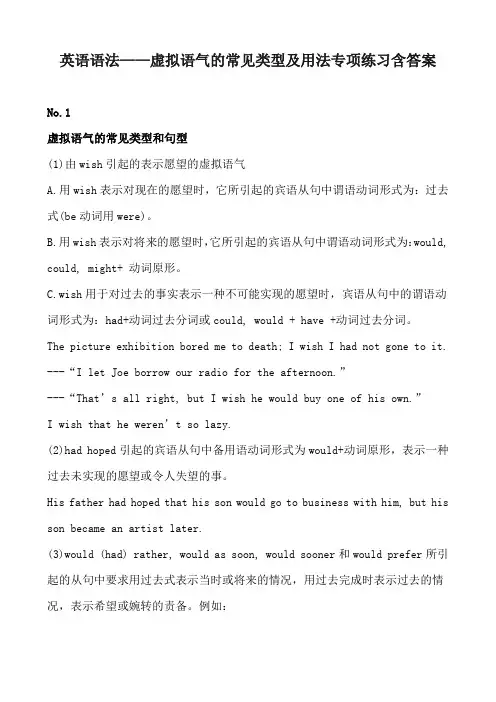
英语语法——虚拟语气的常见类型及用法专项练习含答案No.1虚拟语气的常见类型和句型(1)由wish引起的表示愿望的虚拟语气A.用wish表示对现在的愿望时,它所引起的宾语从句中谓语动词形式为:过去式(be动词用were)。
B.用wish表示对将来的愿望时,它所引起的宾语从句中谓语动词形式为:would, could, might+ 动词原形。
C.wish用于对过去的事实表示一种不可能实现的愿望时,宾语从句中的谓语动词形式为:had+动词过去分词或could, would + have +动词过去分词。
The picture exhibition bored me to death; I wish I had not gone to it. ---“I let Joe borrow our radio for the afternoon.”---“That’s all right, but I wish he would buy one of his own.”I wish that he weren’t so lazy.(2)had hoped引起的宾语从句中备用语动词形式为would+动词原形,表示一种过去未实现的愿望或令人失望的事。
His father had hoped that his son would go to business with him, but his son became an artist later.(3)would (had) rather, would as soon, would sooner和would prefer所引起的从句中要求用过去式表示当时或将来的情况,用过去完成时表示过去的情况,表示希望或婉转的责备。
例如:I’d rather yo u posted the letter right away. 我倒希望你把这封信立刻寄出去。
I would prefer he didn’t stay there too long.我倒希望他不要在那儿可得太久。
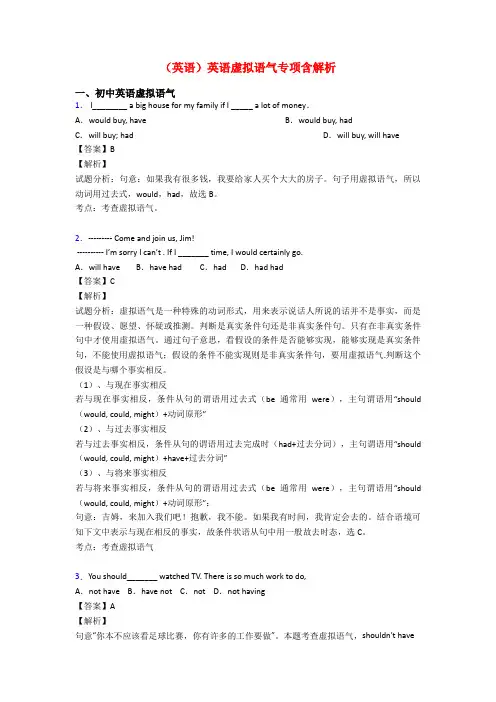
(英语)英语虚拟语气专项含解析一、初中英语虚拟语气1. I________ a big house for my family if I _____ a lot of money.A.would buy, have B.would buy, hadC.will buy; had D.will buy, will have【答案】B【解析】试题分析:句意:如果我有很多钱,我要给家人买个大大的房子。
句子用虚拟语气,所以动词用过去式,would,had,故选B。
考点:考查虚拟语气。
2.--------- Come and join us, Jim!---------- I’m sorry I can’t . If I _______ time, I would certainly go.A.will have B.have had C.had D.had had【答案】C【解析】试题分析:虚拟语气是一种特殊的动词形式,用来表示说话人所说的话并不是事实,而是一种假设、愿望、怀疑或推测。
判断是真实条件句还是非真实条件句。
只有在非真实条件句中才使用虚拟语气。
通过句子意思,看假设的条件是否能够实现,能够实现是真实条件句,不能使用虚拟语气;假设的条件不能实现则是非真实条件句,要用虚拟语气.判断这个假设是与哪个事实相反。
(1)、与现在事实相反若与现在事实相反,条件从句的谓语用过去式(be通常用were),主句谓语用“should (would, could, might)+动词原形”(2)、与过去事实相反若与过去事实相反,条件从句的谓语用过去完成时(had+过去分词),主句谓语用“should (would, could, might)+have+过去分词”(3)、与将来事实相反若与将来事实相反,条件从句的谓语用过去式(be通常用were),主句谓语用“should (would, could, might)+动词原形”:句意:吉姆,来加入我们吧!抱歉,我不能。
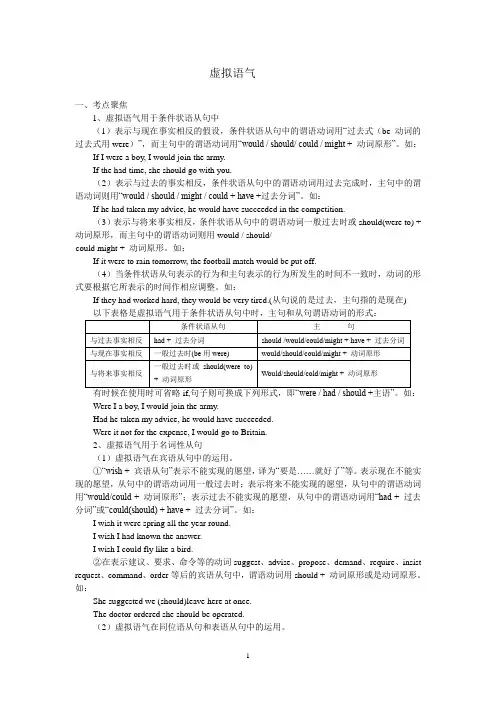
虚拟语气一、考点聚焦1、虚拟语气用于条件状语从句中(1)表示与现在事实相反的假设,条件状语从句中的谓语动词用“过去式(be动词的过去式用were)”,而主句中的谓语动词用“would / should/ could / might + 动词原形”。
如:If I were a boy, I would join the army.If the had time, she should go with you.(2)表示与过去的事实相反,条件状语从句中的谓语动词用过去完成时,主句中的谓语动词则用“would / should / might / could + have +过去分词”。
如:If he had taken my advice, he would have succeeded in the competition.(3)表示与将来事实相反,条件状语从句中的谓语动词一般过去时或should(were to) + 动词原形,而主句中的谓语动词则用would / should/could might + 动词原形。
如;If it were to rain tomorrow, the football match would be put off.(4)当条件状语从句表示的行为和主句表示的行为所发生的时间不一致时,动词的形式要根据它所表示的时间作相应调整。
如:If they had worked hard, they would be very tired.(从句说的是过去,主句指的是现在)Were I a boy, I would join the army.Had he taken my advice, he would have succeeded.Were it not for the expense, I would go to Britain.2、虚拟语气用于名词性从句(1)虚拟语气在宾语从句中的运用。

高中英语虚拟语气讲解及练习虚拟条件句就是对现实条件的一种虚拟假设,所假设的条件一般不符合事实或与事实相反或在现实中发生的可能性极小。
根据时间的不同,虚拟条件句可分为三种,即与现在事实相反的虚拟条件句、与过去事实相反的虚拟条件句(1)表示与现在事实相反If I had enough money now, I would lend it to you.(2)表示与过去事实相反If he had taken your advice, he wouldn’t have made such a bad mistake.(3)表示与将来事实相反I would go shopping with you if it were to be Sunday tomorrow.1. 虚拟条件句的倒装在虚拟条件句中,为了强调所假设条件的虚拟性,或突出说话人的一种主观愿望,虚拟条件句可用倒装结构。
虚拟条件句的倒装是通过去掉if,把条件从句谓语中的助动词、情态动词或系动词放在句首实现的。
例如:Had I been(= If I had been ) in that situation, I would not have let the thief escape away with so much money.Should there be (= If there should be) a drought, what should we do at that time ?2. 错综时间条件句有时条件从句的动作和主句的动作发生的时间并不一致,这时谓语动词的形式应根据它所要表示的具体时间来确定。
例如:If we hadn’t been working hard in the past few years ,thing s wouldn’t be going so smoothly.3. 含蓄条件句有时假设的情况并不以条件从句的形式表现出来,而是通过某个介词或介词短语(如:with,otherwise,without,but for,in that position)、上下文或其它方式表现出来。
英语语法专项:虚拟语⽓⽤法详解及练习(附答案)虚拟语⽓⽤法详解⼀、条件句中的虚拟语⽓1. 条件句中虚拟语⽓的形式从句中提出⼀种与客观现实不相符或根本不可能存在的条件,主句会产⽣的⼀种不可能获得的结果。
条件句中(1) 将来时的条件句中的虚拟语⽓。
如:If he should go to Qing Hua University, he would make full use of his time. 如果他要上清华⼤学的话,他就会充分利⽤他的时间了。
If he were to come here, he would tell us about it. 如果他要来的话,他会通知我们⼀声。
(2) 现在时的条件句中的虚拟语⽓。
如:If he were free, he would help us. 要是他有空的话,它会帮助我们的。
If he studied at this school, he would know you well. 如果他在这所学校学习的话,它会对你很熟悉。
(3)过去时的条件句中的虚拟语⽓。
如:If I had seen the film, I would have told you about it. 我如果看过这场电影,我会把电影内容告诉你了。
If I had got there earlier, I would have met Mr. Li. 如果我早点到那⼉,我就会会到了李先⽣。
3. 运⽤条件句中的虚拟语⽓时,须注意的⼏个问题(1)当从句的主语为第三⼈称单数时,谓语动词若是系动词be时,可⽤was 代替were。
但在倒装虚拟结构及if I were you, as it were 中,只能⽤were。
如:Were I ten years younger, I would study abroad. 要是我还年轻⼗岁的话,我会去国外学习。
If I were you, I would try my best to grasp the chance. 要是我是你的话,我要尽⼒抓住这次机会。
【英语】中考英语虚拟语气专项练习含解析一、初中英语虚拟语气1.If I______ you, I would take a small present..A.am B.was C.were D.are【答案】C【解析】试题分析:句意:如果我我你,我会那个小的礼物。
句中用虚拟语气,系动词用were,故选C。
考点:考查虚拟语气。
2.I don’t understand how you got a ticket. I always you a careful driver.A.think; are B.am thinking; areC.thought; were D.think; were【答案】C【解析】【详解】句意:我不明白你是怎么得到罚单的。
我一直以为你是一个谨慎的司机。
考查动词时态辨析题。
本句是虚拟语气,与过去事实相反,需用一般过去时;根据句意结构,可知选C。
3.--- If I_______ one million dollars, I would give it to medical research.---If I _______ you, I would give it to charity.A.will have, am B.would have, was C.had, were D.have, is【答案】C【解析】考察虚拟语气。
第一空,虚拟语气,与现在相反,用过去时。
第二空,虚拟语气,与现在相反,用过去时,be动词用were。
故选C4.If I you, I the army.A.am, would join B.were, would join C.am, will join D.were, will join【答案】B【解析】试题分析:句意:如果我是你,我会参军.结合语境可知本句是对客观状况的虚拟,故用过去时态,主句用过去将来时态.选B.考点:if引导的条件状语从句点评:虚拟语气是一种特殊的动词形式,用来表示说话人所说的话并不是事实,而是一种假设、愿望、怀疑或推测。
高中英语虚拟语气讲解及练习虚拟条件句就是对现实条件的一种虚拟假设,所假设的条件一般不符合事实或与事实相反或在现实中发生的可能性极小。
根据时间的不同,虚拟条件句可分为三种,即与现在事实相反的虚拟条件句、与过去事实相反的虚拟条件句(1)表示与现在事实相反If I had enough money now, I would lend it to you.(2)表示与过去事实相反If he had taken your advice, he wouldn’t have made such a bad mistake.(3)表示与将来事实相反I would go shopping with you if it were to be Sunday tomorrow.1. 虚拟条件句的倒装在虚拟条件句中,为了强调所假设条件的虚拟性,或突出说话人的一种主观愿望,虚拟条件句可用倒装结构。
虚拟条件句的倒装是通过去掉if,把条件从句谓语中的助动词、情态动词或系动词放在句首实现的。
例如:Had I been(= If I had been ) in that situation, I would not have let the thief escape away with so much money.Should there be (= If there should be) a drought, what should we do at that time ?2. 错综时间条件句有时条件从句的动作和主句的动作发生的时间并不一致,这时谓语动词的形式应根据它所要表示的具体时间来确定。
例如:If we hadn’t been working hard in the past few years ,thing s wouldn’t be going so smoothly.3. 含蓄条件句有时假设的情况并不以条件从句的形式表现出来,而是通过某个介词或介词短语(如:with,otherwise,without,but for,in that position)、上下文或其它方式表现出来。
高中英语虚拟语气讲解及练习虚拟条件句就是对现实条件的一种虚拟假设,所假设的条件一般不符合事实或与事实相反或在现实中发生的可能性极小。
根据时间的不同,虚拟条件句可分为三种,即与现在事实相反的虚拟条件句、与过去事实相反的虚拟条件句(1)表示与现在事实相反If I had enough money now, I would lend it to you.(2)表示与过去事实相反If he had taken your advice, he wouldn’t have made such a bad mistake.(3)表示与将来事实相反I would go shopping with you if it were to be Sunday tomorrow.1. 虚拟条件句的倒装在虚拟条件句中,为了强调所假设条件的虚拟性,或突出说话人的一种主观愿望,虚拟条件句可用倒装结构。
虚拟条件句的倒装是通过去掉if,把条件从句谓语中的助动词、情态动词或系动词放在句首实现的。
例如:Had I been(= If I had been ) in that situation, I would not have let the thief escape away with so much money.Should there be (= If there should be) a drought, what should we do at that time ?2. 错综时间条件句有时条件从句的动作和主句的动作发生的时间并不一致,这时谓语动词的形式应根据它所要表示的具体时间来确定。
例如:If we hadn’t been working hard in the past few years ,thing s wouldn’t be going so smoothly.3. 含蓄条件句有时假设的情况并不以条件从句的形式表现出来,而是通过某个介词或介词短语(如:with,otherwise,without,but for,in that position)、上下文或其它方式表现出来。
【英语】初中英语虚拟语气专项训练及答案含解析一、初中英语虚拟语气1.– I coughed a lot last night. What should I do?– If I _____ you, I would go to see the doctor at once.A.am B.wereC.was【答案】B【解析】试题分析: 句意:昨晚我不停地咳嗽,我应该怎么办?哪果我是你,我就会马上去看医生。
此句为虚拟语气,与现在事实相反,虚拟语气的条件从句的谓语用过去式(be通常用were),主句谓语用“should (would, could, might)+动词原形”,故选C。
考点:考查虚拟语气。
2.--------- Come and join us, Jim!---------- I’m sorry I can’t . If I _______ time, I would certainly go.A.will have B.have had C.had D.had had【答案】C【解析】试题分析:虚拟语气是一种特殊的动词形式,用来表示说话人所说的话并不是事实,而是一种假设、愿望、怀疑或推测。
判断是真实条件句还是非真实条件句。
只有在非真实条件句中才使用虚拟语气。
通过句子意思,看假设的条件是否能够实现,能够实现是真实条件句,不能使用虚拟语气;假设的条件不能实现则是非真实条件句,要用虚拟语气.判断这个假设是与哪个事实相反。
(1)、与现在事实相反若与现在事实相反,条件从句的谓语用过去式(be通常用were),主句谓语用“should (would, could, might)+动词原形”(2)、与过去事实相反若与过去事实相反,条件从句的谓语用过去完成时(had+过去分词),主句谓语用“should (would, could, might)+have+过去分词”(3)、与将来事实相反若与将来事实相反,条件从句的谓语用过去式(be通常用were),主句谓语用“should (would, could, might)+动词原形”:句意:吉姆,来加入我们吧!抱歉,我不能。
虚拟语气用法详解一、条件句中的虚拟语气1. 条件句中虚拟语气的形式从句中提出一种与客观现实不相符或根本不可能存在的条件,主句会产生的一种不可能获得的结果。
条件句中的虚拟语气根据不同的时间有三种不同的形式。
2. 条件句中的虚拟语气的举例(1) 将来时的条件句中的虚拟语气。
如:If he should go to Qing Hua University, he would make full use of his time. 如果他要上清华大学的话,他就会充分利用他的时间了。
If he were to come here, he would tell us about it. 如果他要来的话,他会通知我们一声。
(2) 现在时的条件句中的虚拟语气。
如:If he were free, he would help us. 要是他有空的话,它会帮助我们的。
If he studied at this school, he would know you well. 如果他在这所学校学习的话,它会对你很熟悉。
(3) 过去时的条件句中的虚拟语气。
如:If I had seen the film, I would have told you about it. 我如果看过这场电影,我会把电影内容告诉你了。
If I had got there earlier, I would have met Mr. Li. 如果我早点到那儿,我就会会到了李先生。
3. 运用条件句中的虚拟语气时,须注意的几个问题(1) 当从句的主语为第三人称单数时,谓语动词若是系动词be 时,可用was 代替were。
但在倒装虚拟结构及if I were you, as it were 中,只能用were。
如:Were I ten years younger, I would study abroad. 要是我还年轻十岁的话,我会去国外学习。
If I were you, I would try my best to grasp the chance. 要是我是你的话,我要尽力抓住这次机会。
(2) 有时,虚拟条件句中,主、从句的动作若不是同时发生时,须区别对待。
①从句的动作与过去事实相反,而主句的动作与现在或现在正在发生的事实不符。
如:If I had worked hard at school, I would be an engineer, too. 如果我在学校学习刻苦的话,我现在也会使工程师了If they had informed us, we would not come here now. 如果他们通知过我们的话,我们现在就不会来这里了。
②从句的动作与现在事实相反,而主句的动作与过去事实不符。
如:If he were free today, we would have sent him to Beijing. 如果他今天有空的话,我们会已经派他去北京了。
If he knew her, he would have greeted her. 要是他认识她的话,他肯定会去问候她了。
③从句的动作与过去发生的情况相反,而主句的动作与现在正在发生的情况相反。
如:If it had not been raining too much, the crops would be growing much better. 如果天不下太多的雨的话,庄家会长得更好。
If he had been working hard, he would be working in the office now. 要是他工作一直努力的话,他现在已进了办公室了。
(3) 当虚拟条件句的谓语动词含有were, should, had 时,if 可省略,而将were, should, had 等词置于句首。
如:Should he agree to go there, we would send him there. 要是他答应去的话,我们就派他去。
Were she here, she would agree with us. 如果她在这儿的话,她会同意我们的。
Had he learnt about computers, we would have hired him to work here. 如果她懂一些电脑知识的话,我们会已经聘用他来这里工作了(from ) 。
(4) 有时,句子没有直接给出假设情况的条件,而须通过上下文或其他方式来判断。
如:I would have come to see you, but I was too busy. 我本该来看你了,然而我太忙了。
But for his help, we would be working now. 要不是他的帮助,我们还会在工作呢。
Without your instruction, I would not have made such great progress. 要是没有你的指导,我不会取得如此大的进步。
(5) 有时,虚拟条件句中,主、从句可以省略其中的一个,来表示说话人的一种强烈的感情。
①省略从句He would have finished it. 他本该完成了。
You could have passed this exam. 你应该会通过这次考试了。
②省略主句If I were at home now. 要是我现在在家里该多好啊。
If only I had got it. 要是我得到它了该多好啊。
二、其他状语从句的虚拟语气1. 目的状语从句中的虚拟语气(1) 在for fear that, in case, lest 引导的目的状语从句中,若用虚拟语气时,从句谓语为:should + 动词原形。
并且should 不能省略She examined the door again for fear that a thief should come in. 她又把门检查了一遍,以防盗贼的进入。
He started out earlier lest he should be late. 他很早就出发了以防迟到。
(2) 在so that, in order that 所引导的目的状语从句中,从句中的谓语为:can / may / could / might / will / would /should + 动词原形。
如(from ) :He goes closer to the speaker so that he can hear him clearer. 他走近说话的人以便能挺得更清楚。
He read the letter carefully in order that he should not miss a word. 他把信读得很仔细以便不漏掉一个单词。
2. 让步状语从句中的虚拟语气(1) 在even if, even though 所引导的让步状语从句中,可用虚拟语气,主句、从句的结构与if 所引导的条件从句结构相同。
如:Even if he were here himself, he should not know what to do. 即使他亲自来也不知该怎么办。
Nobody could save him even though Hua Tuo should come here. 即使华佗在世也救不了他。
(2) 在whatever, whichever, whenever, whoever, wherever, however, no matter wh-word 等引导的让步状语从句中,从句虚拟语气结构为:① may + 动词原形(指现在或将来)。
如:We will finish it on time no matter what / whatever may happen. 不管发生什么事,我们都要按时完成。
We will find him wherever / no matter where he may be. 无论他在哪里,我们都要找到他。
I will wait for him no matter how late he may come. 不管他来的多么晚,我都会等他。
② may + 完成式(指过去) ,主句结构不限。
如:You mustn ' t be proud whatever / no matter what great progress you may have made. 不管你取得了多么大的进步,你也不能骄傲(from ) 。
We must respect him no matter what / whatever mistakes he may have made. 不管他翻过什么错误,我们必须尊敬他。
(3) 在though, although 等引导的让步状语从句中,从句虚拟语气结构为should + 动词原形,主句结构不限。
如:Although / Though he should often be late, he is a good student. 尽管他经常迟到,他还是个好学生。
Although / Though he should be secretary, he must obey the rules. 尽管他是书记,他也必须遵守规定。
3. 方式状语从句中的虚拟语气例如:They began to talk warmly as if they had known each other for long. 他们开始热烈的谈论起来就好像他们已相互认识很久了。
He coughed twice as if someone should come. 他咳嗽两声就好像有人要来了。
4. 原因状语从句中的虚拟语气amazed, angry, annoyed, astonished, disappointed, frightened, happy, pleased, proud, sorry, surprised, upset 等后面的状语从句中常用虚拟语气。
其虚拟语气的结构为:① should + 原形动词( 指现在或将来)。
如:He was angry that you should call him by name. 他很生气,你竟然对他直呼其名。
I was astonished that he should not answer such an easy question. 我很惊讶他竟答不出如此简单的问题。
② should + 完成式, 指过去。
如:I ' m very sorry that you should have failed the exam. 我很遗憾,你这次考试竟然失败了。